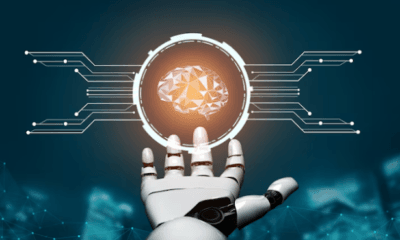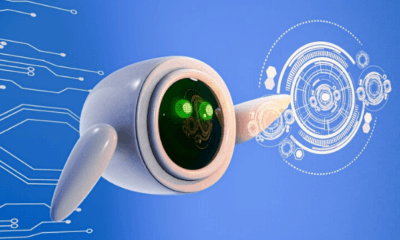AI
Why AI Should Be Regulated: Ensuring Safe and Ethical Use
Businessreign.com
Artificial intelligence (AI) is rapidly transforming our world, from the way we work to the way we interact with each other. As AI technology continues to evolve, it is crucial to consider the potential risks and benefits of its use. While AI has the potential to improve our lives in many ways, it is also important to ensure that it is used in a safe and ethical manner.
The Need for Regulation
One of the main reasons why AI should be regulated is to protect individuals from harm. AI systems can be used to make decisions that have a significant impact on people’s lives, such as whether they are granted a loan or hired for a job. If AI systems are not properly regulated, they could make decisions that are discriminatory or unfair.
In addition, AI systems can be used to collect and analyze large amounts of data about individuals. This data could be used to manipulate or exploit people, or it could be used to violate their privacy. It is important to have regulations in place to protect individuals’ privacy and ensure that their data is used responsibly.
Benefits of Regulation
Regulating AI can also have a number of benefits for businesses and society as a whole. By establishing clear guidelines for the development and use of AI, regulation can help to promote innovation and investment in AI technology. It can also help to build public trust in AI and reduce the risk of backlash against its use.
In addition, regulation can help to ensure that AI is used in a way that benefits society as a whole. For example, regulations could be used to promote the use of AI to develop new medical treatments or to improve the efficiency of transportation systems.
Challenges of Regulation
Despite the benefits of regulating AI, there are also a number of challenges that need to be addressed. One challenge is that AI technology is constantly evolving, which means that regulations need to be flexible enough to adapt to new developments.
Another challenge is that AI is often used in a global context, which means that it is difficult to develop regulations that are effective in all countries. Additionally, there is a risk that regulations could stifle innovation if they are too restrictive.
Moving Forward
Despite the challenges, it is important to start developing a regulatory framework for AI. As AI technology continues to develop, it is becoming increasingly clear that regulation is necessary to protect individuals and society as a whole.
By working together, governments, businesses, and civil society organizations can develop regulations that promote the safe and ethical use of AI. By doing so, we can ensure that AI is used to benefit humanity and not to harm it.
Additional Considerations
In addition to the points discussed above, it is also important to consider the following when developing regulations for AI:
- The potential for AI to be used for malicious purposes, such as cyberattacks or autonomous weapons.
- The impact of AI on the workforce, as AI systems could automate many jobs that are currently done by humans.
- The ethical implications of AI, such as the potential for AI systems to make decisions that are biased or discriminatory.
Conclusion
AI is a powerful technology with the potential to transform our world in many ways. However, it is important to use AI responsibly and ethically. Regulation can play an important role in ensuring that AI is used in a way that benefits humanity and not to harm it. By working together, we can develop regulations that promote the safe and ethical use of AI.
About The Author
AI
Artificial Intelligence Debate: Exploring the Pros and Cons for Society

Businessreign.com – Artificial intelligence (AI) has revolutionized various aspects of our lives, from the smartphones we carry to the cars we drive. While AI has undoubtedly brought about significant advancements, it has also sparked a heated debate about its overall impact on humanity.
The Benefits of Artificial Intelligence
Proponents of AI highlight numerous advantages that this technology offers to society. These include:
- Enhanced Efficiency and Productivity: AI automates repetitive tasks, freeing up human workers to focus on more complex and creative endeavors. This automation streamlines processes, increases output, and reduces costs across various sectors.
- Improved Decision-Making: AI algorithms can analyze vast amounts of data to identify patterns, trends, and anomalies that humans might miss. This capability enables better-informed decisions in areas such as healthcare, finance, and risk assessment.
- Personalized Experiences: AI tailors products, services, and content to individual preferences and needs. This personalization enhances user experiences, improves customer satisfaction, and drives engagement.
- Advanced Scientific Research: AI accelerates scientific breakthroughs by analyzing complex data, generating hypotheses, and conducting simulations. This contribution drives progress in fields like medicine, materials science, and environmental research.
The Concerns Surrounding Artificial Intelligence
Despite its undeniable benefits, AI raises concerns that have fueled a debate about its overall impact on society. These concerns include:
- Job Displacement: AI automation raises fears of widespread job losses, particularly in industries reliant on repetitive tasks. This displacement could lead to economic hardship and social unrest.
- Algorithmic Bias: AI algorithms can perpetuate existing biases in the data they are trained on. This bias can lead to discriminatory outcomes in areas like hiring, loan applications, and criminal justice.
- Privacy and Security Risks: AI systems collect and analyze vast amounts of personal data, raising concerns about privacy breaches and misuse of information. This data can be exploited for surveillance, manipulation, and identity theft.
- Loss of Control and Ethical Dilemmas: The increasing sophistication of AI raises concerns about human control over these systems. Ethical dilemmas arise when AI makes decisions that have significant consequences for individuals and society.
Navigating the Future of AI
As AI continues to evolve, it is crucial to address both its potential benefits and its associated risks. Governments, businesses, and individuals must collaborate to ensure that AI is developed and used responsibly, ethically, and for the betterment of society.
Conclusion
AI is a powerful tool that has the potential to transform our world for the better. However, it is essential to approach AI with caution and foresight, ensuring that its development and application align with human values and societal well-being. By carefully navigating the pros and cons of AI, we can harness its power to create a future that benefits all of humanity
About The Author
AI
The Double-Edged Sword: Exploring the Pros and Cons of Artificial Intelligence

Businessreign.com – Artificial intelligence (AI) has permeated nearly every aspect of our lives, from the smartphones we carry to the cars we drive. While AI has undoubtedly brought about significant advancements, it has also sparked a heated debate about its overall impact on humanity.
The Benefits of Artificial Intelligence
Proponents of AI highlight numerous advantages that this technology offers to society. These include:
- Enhanced Efficiency and Productivity: AI automates repetitive tasks, freeing up human workers to focus on more complex and creative endeavors. This automation streamlines processes, increases output, and reduces costs across various sectors.
- Improved Decision-Making: AI algorithms can analyze vast amounts of data to identify patterns, trends, and anomalies that humans might miss. This capability enables better-informed decisions in areas such as healthcare, finance, and risk assessment.
- Personalized Experiences: AI tailors products, services, and content to individual preferences and needs. This personalization enhances user experiences, improves customer satisfaction, and drives engagement.
- Advanced Scientific Research: AI accelerates scientific breakthroughs by analyzing complex data, generating hypotheses, and conducting simulations. This contribution drives progress in fields like medicine, materials science, and environmental research.
The Concerns Surrounding Artificial Intelligence
Despite its undeniable benefits, AI raises concerns that have fueled a debate about its overall impact on society. These concerns include:
- Job Displacement: AI automation raises fears of widespread job losses, particularly in industries reliant on repetitive tasks. This displacement could lead to economic hardship and social unrest.
- Algorithmic Bias: AI algorithms can perpetuate existing biases in the data they are trained on. This bias can lead to discriminatory outcomes in areas like hiring, loan applications, and criminal justice.
- Privacy and Security Risks: AI systems collect and analyze vast amounts of personal data, raising concerns about privacy breaches and misuse of information. This data can be exploited for surveillance, manipulation, and identity theft.
- Loss of Control and Ethical Dilemmas: The increasing sophistication of AI raises concerns about human control over these systems. Ethical dilemmas arise when AI makes decisions that have significant consequences for individuals and society.
Navigating the Future of AI
As AI continues to evolve, it is crucial to address both its potential benefits and its associated risks. Governments, businesses, and individuals must collaborate to ensure that AI is developed and used responsibly, ethically, and for the betterment of society.
Conclusion
AI is a powerful tool that has the potential to transform our world for the better. However, it is essential to approach AI with caution and foresight, ensuring that its development and application align with human values and societal well-being. By carefully navigating the pros and cons of AI, we can harness its power to create a future that benefits all of humanity.
About The Author
AI
Artificial Intelligence Debate: Exploring the Pros and Cons for Society

Businessreign.com – Artificial intelligence (AI) has permeated nearly every aspect of our lives, from the smartphones we carry to the cars we drive. While AI has undoubtedly brought about significant advancements, it has also sparked a heated debate about its overall impact on humanity.
The Benefits of Artificial Intelligence
Proponents of AI highlight numerous advantages that this technology offers to society. These include:
- Enhanced Efficiency and Productivity: AI automates repetitive tasks, freeing up human workers to focus on more complex and creative endeavors. This automation streamlines processes, increases output, and reduces costs across various sectors.
- Improved Decision-Making: AI algorithms can analyze vast amounts of data to identify patterns, trends, and anomalies that humans might miss. This capability enables better-informed decisions in areas such as healthcare, finance, and risk assessment.
- Personalized Experiences: AI tailors products, services, and content to individual preferences and needs. This personalization enhances user experiences, improves customer satisfaction, and drives engagement.
- Advanced Scientific Research: AI accelerates scientific breakthroughs by analyzing complex data, generating hypotheses, and conducting simulations. This contribution drives progress in fields like medicine, materials science, and environmental research.
The Concerns Surrounding Artificial Intelligence
Despite its undeniable benefits, AI raises concerns that have fueled a debate about its overall impact on society. These concerns include:
- Job Displacement: AI automation raises fears of widespread job losses, particularly in industries reliant on repetitive tasks. This displacement could lead to economic hardship and social unrest.
- Algorithmic Bias: AI algorithms can perpetuate existing biases in the data they are trained on. This bias can lead to discriminatory outcomes in areas like hiring, loan applications, and criminal justice.
- Privacy and Security Risks: AI systems collect and analyze vast amounts of personal data, raising concerns about privacy breaches and misuse of information. This data can be exploited for surveillance, manipulation, and identity theft.
- Loss of Control and Ethical Dilemmas: The increasing sophistication of AI raises concerns about human control over these systems. Ethical dilemmas arise when AI makes decisions that have significant consequences for individuals and society.
Navigating the Future of AI
As AI continues to evolve, it is crucial to address both its potential benefits and its associated risks. Governments, businesses, and individuals must collaborate to ensure that AI is developed and used responsibly, ethically, and for the betterment of society.
Conclusion
AI is a powerful tool that has the potential to transform our world for the better. However, it is essential to approach AI with caution and foresight, ensuring that its development and application align with human values and societal well-being. By carefully navigating the pros and cons of AI, we can harness its power to create a future that benefits all of humanity.
About The Author

 Business9 months ago
Business9 months agoMaster Business Planning: Essential Guide for Aspiring Entrepreneurs
- AI9 months ago
Should AI Be Banned: Pros, Cons, and the Future of Education

 Business9 months ago
Business9 months agoBusiness Innovation: Top Idea Generation Techniques for Entrepreneurs

 Artificial Intelligence9 months ago
Artificial Intelligence9 months agoIs Artificial Intelligence Good for Society? A Balanced Debate Essay

 Business9 months ago
Business9 months agoOldest private members’ clubs London: Historical Gems

 Business9 months ago
Business9 months agoFamous private clubs in London: Renowned Establishments

 AI9 months ago
AI9 months agoArtificial Intelligence Debate: Exploring the Pros and Cons for Society

 Artificial Intelligence9 months ago
Artificial Intelligence9 months agoArtificial Intelligence Is a Threat to Humanity: Debate Points


